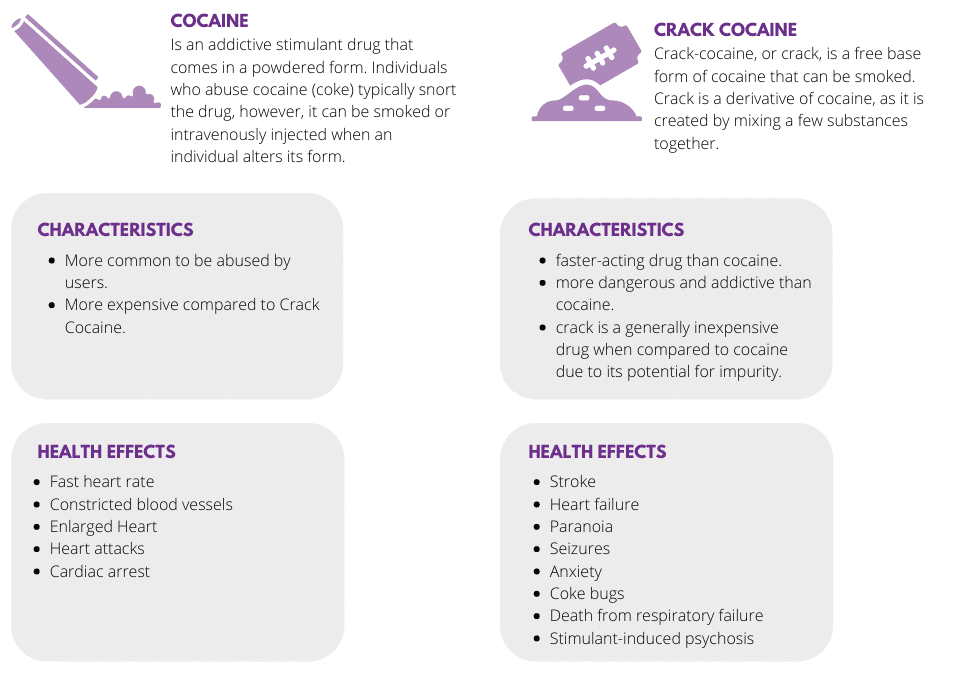When most people think of crack or cocaine, they tend to lump them together. While this is understandable, there are some major differences between crack and cocaine. To begin, cocaine is an addictive stimulant drug that comes in a powdered form. Individuals who abuse cocaine (coke) typically snort the drug, however, it can be smoked or intravenously injected when an individual alters its form. On the other hand, crack-cocaine, or crack, is a free base form of cocaine that can be smoked. Crack is a derivative of cocaine, as it is created by mixing a few substances together. The resulting compound when hardened resembles something similar to salt rock, hence the street name “crack rock.”
While both substances are extremely addictive, crack is considered to be more dangerous than cocaine. However, it is more common to abuse cocaine than crack. In fact, according to research in 2017, 17% of individuals reported using cocaine at one point in their lifetime, while only 4.3% of individuals reported using crack.
If you or a loved one suffer from a substance use disorder, it is vital to understand the differences between the two substances. In doing so, you will be able to identify which substance an individual is using and help them to find the appropriate drug treatment program. Read more to learn about the similarities and the differences between crack and cocaine.
Table of Contents
ToggleSigns of Cocaine Abuse
Oftentimes, individuals abusing cocaine attempt to hide their usage of the drug from their friends and family. If you are concerned that your loved one is suffering from cocaine addiction, there are physical, psychological, and health effects to be aware of.
The physical symptoms of cocaine abuse include:
- Dilated pupils
- Runny nose (snorting)
- Nosebleeds (snorting)
- Track marks (injecting)
- Burned lips or fingers (smoking)
The health effects of cocaine abuse are typically heart-related, including:
- Fast heart rate
- Constricted blood vessels
- Enlarged Heart
- Heart attacks
- Cardiac arrest
Individuals abusing cocaine will display mental symptoms including, but not limited to:
- Euphoria
- Overconfidence
- Unusual excitement
- Aggressiveness
- Paranoia
- Poor judgment
- Delusions
- Hallucinations
In addition to the previously mentioned symptoms of cocaine abuse, individuals who frequently binge on cocaine will experience a “comedown” or a “cocaine crash”. These symptoms can include depression, agitation, apathy, exhaustion, intense cravings for cocaine, and a need for a higher dosage due to the development of tolerance. If you or a loved one have displayed any of these symptoms, it may be time to seek out professional cocaine addiction help.
Signs of Crack Abuse
While the signs of crack abuse may be similar to that of cocaine, they are typically more severe and obvious. Many individuals are very good at hiding their substance abuse, however, most people can not hide an addiction to crack.
The common signs of crack abuse include:
- Dilated pupils
- Restlessness
- Increased rate of breathing
- Burns on their fingers
- Burns or blisters on their lips from smoking out of hot pipes
- Aggressiveness
- This person will disappear a lot – to go get high. The drugs’ effects do not last that long (similar to cocaine)
Additionally, crack causes immediate effects that can be very dangerous. Some of the immediate effects of crack include:
- Stroke
- Heart failure
- Paranoia
- Seizures
- Anxiety
- “Coke bugs” – people on crack have a tendency to hallucinate that bugs are burrowing under their skin
- Death from respiratory failure
- Stimulant-induced psychosis
The long-term effects of crack addiction can include depression, sexual dysfunction, stroke, heart attack, infertility, death, kidney failure. Unfortunately, crack is extremely addictive. So much so, that some people report becoming addicted to it after only the first use. If you or a loved one are suffering from crack addiction – it is time to reach out for help. Crack addiction can lead to an array of mental and physical health issues and in extreme cases, death.
The Differences Between Crack and Cocaine
Because crack originates from cocaine, the two drugs share some basic similarities. For example, both drugs are stimulants and cause adverse reactions within an individual’s cardiovascular system. Additionally, both drugs work by triggering a rush of euphoria-inducing dopamine into the brain. Both create a powerful high that can overload the brain’s reward centers, causing an intense comedown.
However, many individuals argue that the comedown from crack is significantly worse than that of a typical coke comedown. Nevertheless, both substances are known as some of the most addictive drugs available and contain the potential for severe adverse physiological and psychological effects.
While there are significant similarities, both drugs share distinctive differences when compared. Some of the major differences between crack and cocaine include the following:
- Expense- crack is a generally inexpensive drug when compared to cocaine due to its potential for impurity.
- Popularity- cocaine is more frequently abused in the united states when compared to crack.
- Age– crack is a newer drug than cocaine, as the use of the coca plant dates back to the B.C. era, and crack use became popular in the 1980s.
- Effect time– crack is a faster-acting drug than cocaine.
- Addiction and danger– because crack is a faster-acting drug, it is also considered more dangerous and addictive than cocaine.
- Purity and form- cocaine is typically a more pure substance than crack is, due to the way crack is made.
While there are some major differences between these substances, abuse or addiction of either requires professional rehabilitation treatment. If you or a loved one is addicted to either of these drugs, a facility specializing in drug addiction treatment would be most beneficial. Both cocaine and crack addiction can lead to life-threatening consequences so, please, get help as soon as possible.
Treatment for Crack and/or Cocaine Addiction
Professional rehab programs such as Agape Treatment Center offer comprehensive treatment plans. Typically, individuals attending our drug addiction treatment program have the opportunity to receive customized and individualized treatment plans. Additionally, individuals addicted to these drugs will begin a medically supervised detox program to help ease their symptoms of withdrawal as well as decrease their drug cravings. As a result, individuals recovering from cocaine addiction are able to fully focus on their recovery without distraction. To learn more about our high-quality crack and cocaine rehabilitation program, contact us today!







